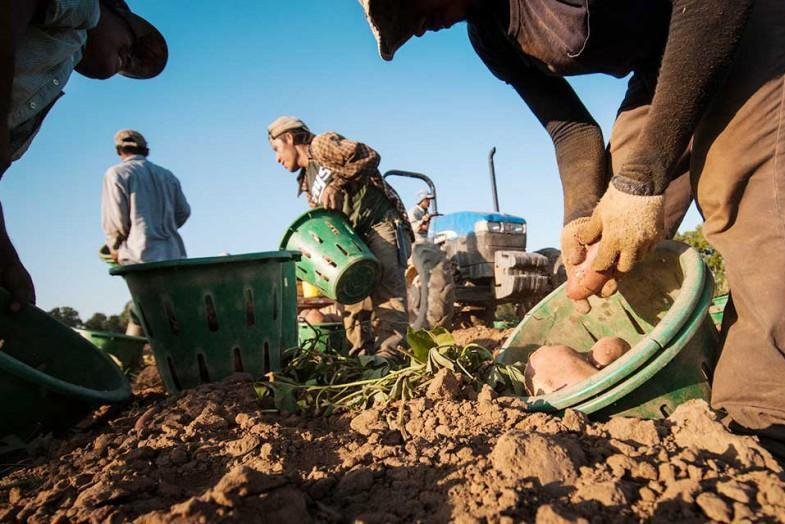While most of the American agricultural industry will benefit from free trade with Canada and Mexico, fresh produce growers say they cannot compete with the cheap and abundant supplies of Mexican fruits and vegetables. File Photo courtesy of the USDA
EVANSVILLE, Ind., Dec. 12 (UPI) -- American farmers are split over the new United States Mexico Canada trade deal.
Many celebrated the news that House Democrats and the Trump administration agreed on the USMCA, as it means free trade can continue with America's two largest agricultural buyers.
"This is welcome news and a relief for American farmers," Angela Hofmann, co-executive director of the nonprofit advocacy group Farmers for Free Trade, said in a statement. "Passing USMCA will guarantee that our farmers' closest and most important markets will remain free from tariffs and red tape."
But this is not good news for all farming sectors.
Mexico grows more fresh produce than the United States and at a substantially lower cost. So, a free trade agreement opens the door for the cheaper Mexican produce to replace American-grown vegetables and fruits in U.S. markets.
"We are under severe pressure," said Alan Schreiber, executive director of the Washington Asparagus Commission and the Washington Blueberry Commission. "Under free trade with NAFTA, we were being annihilated. I don't know exactly what is in the new deal, but if it maintains that free trade, it is going to hurt us."
Leaders from the United States, Mexico and Canada agreed to the new deal Tuesday. The U.S. House is expected to vote on the deal next week. It's unclear when the U.S. Senate will vote.
The details of how the latest version of the USMCA deal will handle fresh produce trade were not available Wednesday, though agricultural experts say it likely maintains the same free and open trade established by the North American Free Trade Agreement in 1993.
That's a good deal for agriculture in general, economists say.
In 2019, the United States is expected to export roughly $137 billion in agricultural goods, according to the U.S. Department of Agriculture. Canada is the leading importer, accounting for $21.5 billion. Mexico is the second-largest buyer, at $19.7 billion.
China used to be America's biggest agricultural buyer before the trade war severely reduced trade between the two countries.
"It is pretty critical that trade stay open between the three countries," said Veronica Nigh, an economist at the American Farm Bureau Federation. "All this discussion about NAFTA taught us how important that trade is to our agricultural systems."
The commodities that benefit most from the deal are corn, dairy and beef and pork, Nigh said.
Each of those industries lost major markets in China when the trade war began in July 2018 and would have suffered further had trade with Canada and Mexico also collapsed.
"It's been a brutal year for many farmers who really need the certainty this [deal] would provide for agricultural trade," Kevin Ross, president of the National Corn Growers Association, said in a statement. "NCGA's top legislative priority in 2019 has been passing USMCA."
Other major agricultural groups had similar reactions.
Jim Mulhern, president and CEO of the National Milk Producers Federation, called the deal "a boon to America's dairy farmers," while the National Pork Producers Council applauded the effort made to secure a deal.
"Last year, Canada and Mexico took over 40 percent of the pork that was exported from the United States, and a similar percentage is expected this year," the council said in a statement.
But for fresh produce growers, it's a much different story.
"Back in 1993, when we were first negotiating NAFTA, the leadership here was opposed to it," John Walt Boatright, director of national affairs at the Florida Farm Bureau Federation, told UPI in October.
"They opposed it, while the rest of the nation's agricultural groups were for it," Boatwright said. "They knew it would give Mexico the opportunity to bring cheap food in with no recourse for our farmers. And, unfortunately, they were right."
The Florida Farm Bureau Federation could not be reached for comment Wednesday.
With cheap Mexican produce flowing freely across the border, American produce farms are ceasing production or reducing output. The country lost more than 500,000 acres of fruit, vegetable and nut farms between 2007 and 2017, dropping from 7.8 million to 7.3 million acres, according to the USDA.
"This is a huge topic right now in the fresh produce industries," Schreiber said.
Asparagus production across the United States is declining, he said.
"In California, it's completely collapsed," he said. "They just got wiped out by Mexico."
Blueberry and raspberry growers are experiencing similar pain, he said, with prices falling as Mexican imports balloon. The tomato, pepper, eggplant, cucumber, strawberry and other fresh produce industries also say they are hurting.
"We're almost not covering the cost of production now," Gary Larson, an asparagus grower in Washington state, told UPI in October. "I'm very worried. I have a 24-year-old son who is just starting to take over our farm. His future as an asparagus grower is really bleak."















